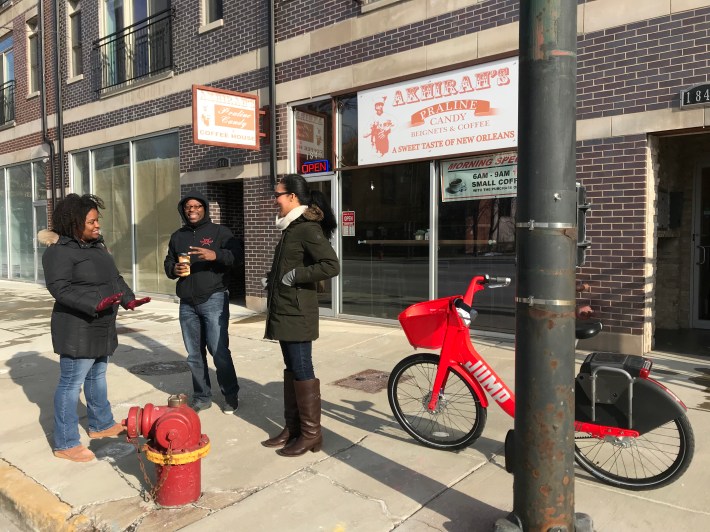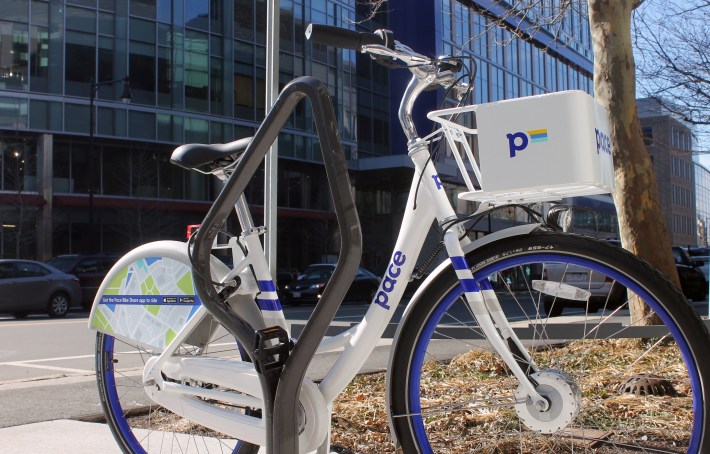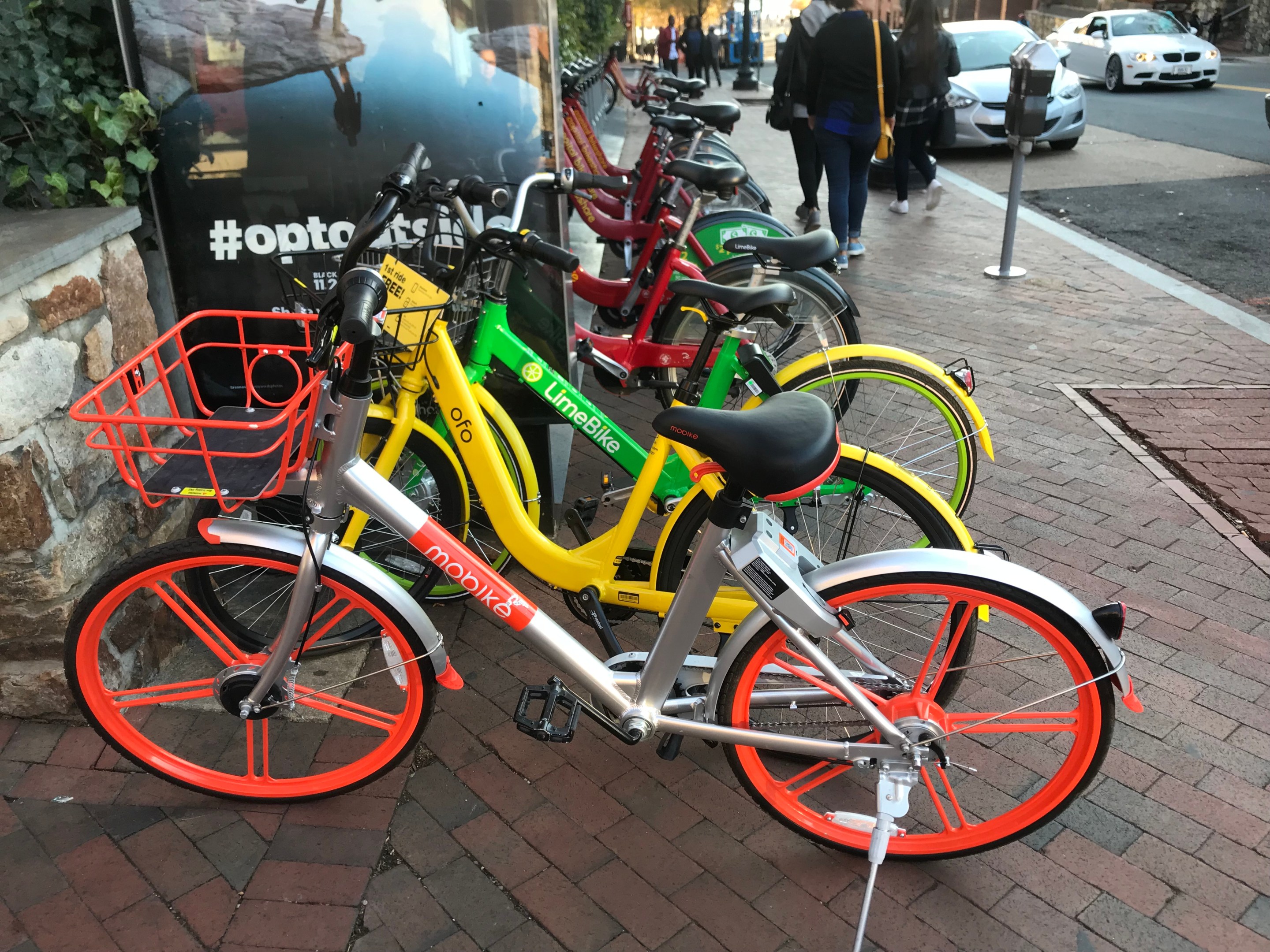For several months, Streetsblog Chicago has been tracking the Chicago Department of Transportation's decision-making process on allowing dockless bike-share providers to operate in our city -- see several articles linked at the bottom of this page. I was notified earlier this week by a vendor that CDOT had drafted permit requirements for dockless systems that were being reviewed by local stakeholders and dockless companies.
Tuesday morning I requested a copy of the draft from CDOT and was told that officials would look into the possibility of providing the document. The department never got back to me, but the same day the final permitting requirements were published on the CDOT website without notice. Just before 4 p.m. today, I was notified by the department that the rules had been made public. It appears that this was a considerable amount of time after CDOT had already provided the document to a mainstream news outlet. CDOT declined to provide a comment to Streetsblog Chicago about the launch, although it did provide a statement to the mainstream outlet. Nevertheless, Streetsblog was the first publication to break the news of Chicago's upcoming dockless bike-share launch.
Dockless bike-share, aka DoBi (“Dough Bee”), lets members use a smartphone app to locate and check out cycles and park them anywhere in the service area. The dockless companies, propped up by venture capital, offer cheap rental rates, generally $1 for a half-hour trip, compared to $3 for a single Divvy journey.
According to the permitting requirements (read them here), the city will be launching a pilot program next Tuesday, May 1, and the test will run until November 1, 2018. LimeBike spokeswoman Emma Green confirmed that the company plans to launch in Chicago on Tuesday with 50 bikes, the limit for "free-locked"-style DoBi cycles, as stated in the permit requirements. That's a fraction of the 400 bikes per company that Washington D.C. -- the only major U.S. city with both a large, successful docked system and DoBi -- has allowed to hit the streets.
Green said they'll be launching in ten wards on the South Side, as required by the permitting guidelines. The document roughly defines the DoBi coverage area as being between all territory within the city limits south of 79th Street and west of the Chicago Skyway. See details on the boundaries in the tweet below.
If I'm reading this correctly from CDOT's guidelines for dockless bike share, the geographic area allowed is from 79th Street to 138th Street. I guess I won't have much chance to try dockless bikes this year after all! That's disappointing. pic.twitter.com/BzCHF4wyEs
— Michelle K Stenzel (@MichelleStenzel) April 26, 2018
Green noted that the 19th Ward, which includes parts of the Far Southwest Side Beverly neighborhood, has particularly been clamoring for DoBi. That's more than a little ironic. In 2012 local Alderman Matthew O'Shea said in City Council, "If you never put a bike lane in my ward, that's too soon." But since then, Beverly residents have lobbied to get Divvy stations, and the aldermen has come around to supporting that effort.
“The communities of Beverly, Morgan Park, and Mt. Greenwood are excited to welcome bike-sharing to our streets,” O’Shea said in a statement. “We look forward to this pilot program and the improvement to our quality of life that it will mean.”

“We’re excited to serve communities like the 19th Ward who have not yet had access to bikeshare,” said Jessie Lucci, LimeBike Chicago General Manager in a statement. “In markets like D.C. and Los Angeles, we’ve seen the impact LimeBike has in areas with limited access to reliable, affordable transportation, and we believe the dock-free system allows us to provide the most equitable access to healthy, sustainable mobility.”
LimeBike governmental affairs director Gabriel Scheer acknowledged that trying to serve ten wards with only 50 bikes is going to be an uphill pedal. "From my perspective, 50 bikes is going to be nearly unnoticeable," he said, adding that when DoBi launched in Seattle last summer, vendors were required to release a minimum of 500 bikes. (By that time Seattle's docked bike-share system had already gone out of business.) Currently there are about 10,000 bikes in that city "but people still say it seems like there's not that many of them," Scheer said.
The Chicago permitting regulations allow systems that allow the bikes to be locked to a fixed object with a built-in cable or U-lock, such as Jump Mobility and Zagster, to deploy 250 bikes at the start of the pilot. But since LimeBike and other systems such as Ofo, Spin, and MoBike typically only use bikes with built-in wheel locks, these companies will be limited to only 50 cycles for starters. The rules give companies until July 1 to introduce bikes with cables or U-locks, at which point they can expand to 250 cycles, so Scheer says his company intends to do that. Commercially operated dockless cycles that only have wheel locks will not be allowed on city streets after July 1.

Scheer implied that the Chicago regulations favor systems with bikes that can be locked to a fixed object, called "lock-to" bikes. On the other hand, photos of free-locked DoBi bikes hanging from trees and sign poles, or submerged in bodies of water, are all over social media, whereas it's unlikely that a U-locked Jump bike will wind up at the bottom of the Chicago River.
Jump was recently purchased by Uber, which has Mayor Rahm Emanuel's brother Ari as an investor. Former mayoral aide David Spielfogel is on the advisory board of LimeBike and ex-CDOT deputy commissioner Scott Kubly works for the company. Former CDOT chief Gabe Klein is on the advisory board of Spin.
LimeBike launched the first dockless system in Illinois in Rockford earlier this month, and I recently visited that town to check out the system in person.

The permitting rules state that vendors must be a member in good standing with the North American Bike Share Association or a comparable association. Ofo, a Beijing-base company, like Jump, has provided cycles for low-tech "bike libraries" that will be launching on the Far South Side and North Lawndale this spring. Ofo was recently kicked out of NABSA for lobbying to pass legislation in Florida that would have blocked cities from creating their own bike-share regulations. Ofo representatives have argued that such rules can be used to protect existing docked systems by excluding DoBi systems.
However, Ofo spokesman Taylor Bennett says the company will be participating in the Chicago pilot because it belongs to another accredited organization called BikePlus. "We appreciate the city's leadership in crafting new rules for the future of mobility and we're excited for the opportunity to serve Chicago and provide a more equitable and affordable transportation option," Bennett said.
- If a vendor fails to meet the guidelines, its license may be suspended and it may be required to remove its fleet from city streets within 24 hours.
- Bikes that are parked outside the coverage area may not be rented by a customer (geofencing must be used to ensure this) but must be retrieved by the vendor, so it will be possible to ride a bike outside of the coverage area, but not unlock one there.
- Bikes must be parked in a manner that leaves at least a six-foot sidewalk width for pedestrians.
- Improperly parked parked bikes must be moved by the vendor within two hours of a complaint, or else the city may pick them up and the vendor will incur any costs to the city.
- Vendors must meet with staffers from the Mayor's Office for People with Disabilities and other city staff on a monthly basis to share data about sidewalk obstruction complaints and discuss any other ADA access issues that may arise.
- Each bike in the fleet must receive maintenance at least once a month, including tire inflation (if applicable), checking adjustment of parts, making sure the brakes, gears, and lights are working, and the chain is clean and lubed.
- Bikes must be rebalanced daily to ensure that each quadrant of the service area has a minimum of 15 percent of the fleet.
- Vendors must make the systems accessible to people facing financial and technological barriers, by making it possible to use cash to rent bikes, and access the system without a smartphone.
- Vendors must provide a plan to train and hire residents from the service areas.
- Vendors must share trip information and other data with the city on a monthly basis.
Equiticity founder Oboi Reed has been pushing the city for several months to allow dockless operators to bring their bikes to underserved communities. "Equiticity supports the City's decision to allow dockless bike-share to come to Chicago," Reed told me via text. "We believe strongly in the potential of dockless bike-share to grow cycling in predominantly Black and Brown neighborhoods in our city... We are still digesting the permitting requirements and the resulting equity implications on both dockless and docked bike-share systems and the Divvy system and will share a more formal response in the coming days."




